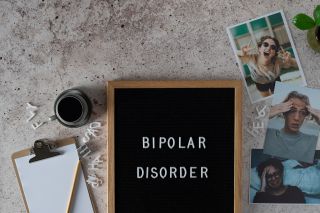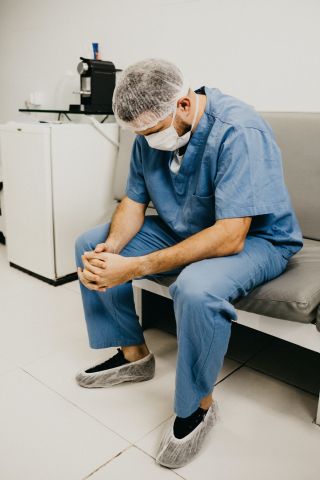Depression
Embracing Imperfection as Healers
Mental health professionals can turn vulnerabilities into assets.
Posted June 2, 2023 Reviewed by Davia Sills
Key points
- There are high rates of depression and suicide among physicians at all levels of training.
- For psychiatrists, admission of our own mental health challenges could reduce—not increase—stigma.
- Healers with "lived experience" of mental illness are in a unique position to benefit patients and themselves.
I’ve dedicated my journalistic life to reducing mental health stigma. I hope to help do that with this article by telling you: I am a psychiatrist who has suffered from depression.
There has historically been a myth that doctors—especially psychiatrists—are fundamentally different from their patients. As a medical student, and perhaps even more strongly as a psychiatry resident, I was taught to maintain that invisible line between doctor and patient. My training director encouraged our residency class to seek psychotherapy in order to understand the process for the benefit of patients. But medication? No one talked about that.

In an unpublished 2003 study, Dr. Steven Roose, Professor of Psychiatry at Columbia, canvassed psychiatry residents about divulging personal information. The residents were generally comfortable revealing that they were in psychotherapy—but not pharmacotherapy. Perhaps admitting that you were taking medication was equivalent to disclosing weakness or, even worse, serious illness.
It was with much relief that I recently found Dr. Ken Duckworth’s new book, You Are Not Alone. Duckworth, the Chief Medical Officer of the National Alliance on Mental Illness (NAMI), was one of my mentors during my psychiatric residency. He had many reasons for writing the book, but a desire to tell real peoples’ stories of mental illness and recovery—including his own—was at its heart. The book is a resource that answers many of the most commonly posed questions about emotional disorders. Duckworth moves deftly from updating us on the latest treatment options for, say, addiction to the stories of those who have lived mental illness from the inside. No one remains anonymous—all interviewees have chosen to reveal their full names.
One of Duckworth’s themes is the value of using lived experience as expertise. Our travails can guide us towards helping others and assist in making meaning of our lives and careers. He shares some of his own ordeals, including an episode of depression and a childhood spent with a father who had severe bipolar disorder.

Duckworth tells me that his father was hospitalized for months at a time. “Then he would come home better, and we’d go to the ballgame… no one would talk about his illness,” he said. In his psychiatry residency applications, Duckworth was honest about his dad’s illness as the driving force in his career choice. But he found that residency interviewers were not welcoming or understanding. “I laid it all out there about my dad’s illness, and it was ignored by almost every program across America.” He was afraid that his years-long dream to become a psychiatrist and help those like his dad would end in defeat.
That same year, I was suffering as a medical student. Depression is never convenient, but it can be devastating for a student just starting out in training. Perfectionism, high expectations, and a history of academic achievement can all contribute to a downward spiral when you’re faced with exceptional academic demands and personal setbacks. The truth is that my nascent medical career almost ended in medical school when I became severely depressed and needed to take a leave of absence. The administrators were not sympathetic or understanding, and I felt like an utter failure.
I had already been leaning toward a career as a psychiatrist. Once I recovered, I was certain of my path. I needed to learn more about how mental illness and stigma interlocked.

Depression among medical students and residents is alarmingly common. A 2016 review study found that 27 percent of medical students experienced depression, while 11 percent had suicidal ideation. The rate of depression among resident physicians has ranged from 20.9 percent to 43.2 percent, depending on the instrument used. These numbers are significantly higher than rates of depression reported for the general 18-29-year-old population. Things don’t get better after residency. Doctors have particularly high rates of anxiety, depression, and suicide throughout their careers.
As the Chief Medical Officer at the American Foundation for Suicide Prevention, Dr. Christine Yu Moutier (a Duckworth interviewee) is on the front lines of saving lives. As a medical student at the University of California at San Diego, she experienced mental health challenges, including depression, anxiety, and an eating disorder.
“I started getting panic attacks on my pediatrics rotation. I left the rotation one day, walked into the office of my Dean of Student Affairs, and tried to quit medical school,” says Moutier.
But Moutier did recover after a leave of absence and therapy. She finished medical school and, as a psychiatrist, ended up working herself as the Assistant Dean for Student Affairs and Medical Education at UCSD.

Moutier’s personal experiences, like Duckworth’s, have fueled her passion for reducing the stigma of mental illness. Moutier founded the Healer Education Assessment and Referral (HEAR) program at UC San Diego, making it easier for medical professionals to access mental health treatment. She feels that her personal suffering has been essential in allowing her to advocate for others.
Fast-forward to the present. A young woman named Pranita Mainali (another Duckworth interviewee) is a psychiatry resident at Case Western Reserve University/Metrohealth Hospital in Ohio. Like Duckworth, Mainali grew up with a parent who had a severe mental illness. Mainali credits her childhood experiences with igniting her fervor for psychiatry.
“My journey was painful, and my passion for psychiatry comes from my immense love for my mother,” says Mainali. Sadly, Mainali’s residency interview experiences reveal that stigma remains: “One interviewer asked for proof that my mother had depression; another asked what medications she had tried and failed. I found these responses insensitive.”
In truth, we psychiatrists have many motivations for healing. Having taken an informal poll among colleagues, I have learned that some of us are simply fascinated by the brain and the psyche, while others—like those interviewed here—have intensely personal reasons to enter the field. Regardless of the reason, our vulnerabilities can help us grow as healers. Somewhere along the way, we can—and must—embrace that we are as deeply human as our patients.




